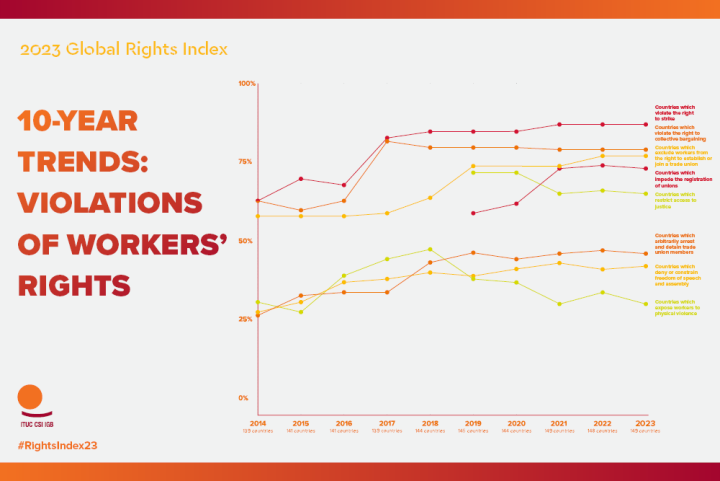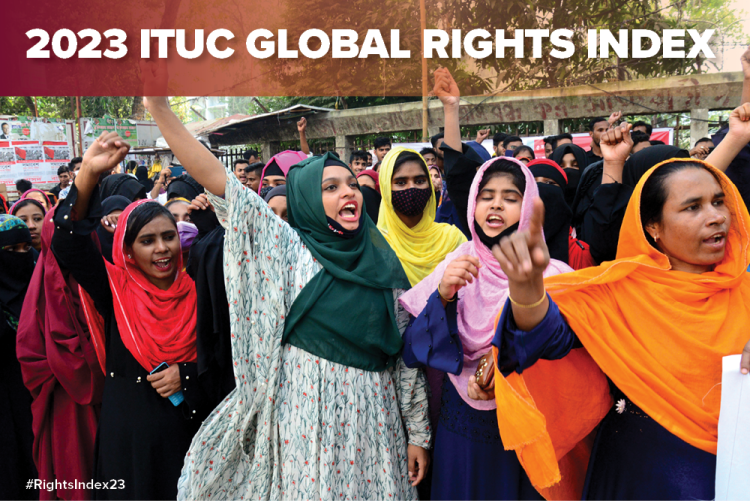From Eswatini to Myanmar, Peru to France, Iran to Korea, workers’ demands to have their labour rights upheld have been ignored and their dissent has been met with increasingly brutal responses from state forces.
The 10 worst countries for working people in 2023 are: Bangladesh, Belarus, Ecuador, Egypt, Eswatini, Guatemala, Myanmar, Tunisia, the Philippines and Turkey.
The 2023 Index shows that key measures of violations of workers’ rights have reached record highs. The International Trade Union Confederation’s (ITUC), Global Rights Index is available here and includes rights abuses and national ratings that can be viewed by country and region.
As a comprehensive review of workers’ rights in law that ranks 149 countries, it is the only database of its kind.
Record high levels of violations include:
- 9 out of 10 countries violated the right to strike. Working people in Canada, Togo, Iran, Cambodia and Spain faced criminal prosecution or dismissal following their decision to strike.
- 77% of countries excluded working people from the right to establish or join a trade union. Migrant, domestic and temporary workers, those in the informal economy, platform workers and workers in Special Economic Zones were denied the right to freedom of association. Burundi, Haiti, India, Turkey and the United Arab Emirates were among the countries that excluded working people from union representation.
- The right to free speech and assembly was restricted in 42% of countries, often resulting in protesting workers facing police brutality. In France, lawful protests were met with vicious police beatings, indiscriminate arrests and tear gas. In Iran, teachers were arrested and beaten by the police for taking part in May Day demonstrations.
Other key figures include:
- 8 out of 10 countries violated the right to collective bargaining. Workers in the Netherlands, North Macedonia, Zimbabwe, Honduras, Indonesia, Montenegro and Serbia have seen their rights to collective bargaining severely reduced.
- 73% of countries impeded the registration of unions or banned them, including in Belarus, Myanmar, Hong Kong, Central African Republic and Guatemala.
- Workers were arrested and detained in 69 countries, with prominent trade union leaders targeted in Myanmar, Hong Kong, Dominican Republic, India and Turkey.
- In 65% of countries working people had no or restricted access to justice. Trade union leaders and workers’ rights advocates in Zimbabwe, China and Kazakhstan were prosecuted on trumped-up charges and their trials were often beset by a disregard for due process.
ITUC Acting General Secretary Luc Triangle said: “The 2023 ITUC Global Rights Index provides shocking evidence that the foundations of democracy are under attack. There is a clear link between workers’ rights being upheld and the strength of any democracy. The erosion of one amounts to the degradation of the other.
“This is the 10th edition of the Index and the 2023 results demonstrate how necessary it is. Across both high-income and low-income countries, as working people have faced a historic cost-of-living crisis and spiralling inflation driven by corporate greed, governments have cracked down on the right to collectively negotiate wage rises and take strike action.
“From Eswatini to Myanmar, Peru to France, Iran to Korea, workers’ demands to have their labour rights upheld have been met with opposition from employers and government indifference, and their dissent has been met with increasingly brutal responses from state forces.”
This graph tracks the shocking increase in the violations of the rights of working people around the world across 10 years:

- The 10 worst countries for working people in 2023 are: Bangladesh, Belarus, Ecuador, Egypt, Eswatini, Guatemala, Myanmar, Tunisia, the Philippines and Turkey.
- Ecuador and Tunisia are new entries. In Ecuador, mass protests calling for democracy and collective rights, organised by Indigenous peoples’ organisations and trade unions, were brutally repressed. In Tunisia, President Kais Saied undermined workers’ civil liberties and democratic institutions.
- Country ratings improved for Australia, Chile and Cote d’Ivoire, but worsened in the Republic of Congo, El Salvador, Haiti, Liberia, Montenegro, Namibia, North Macedonia, Togo and the United Kingdom.
- Workers experienced violence in 44 countries, including Bangladesh, the Philippines and Lebanon. In the Asia-Pacific region, the incidence of violence against working people rose from 43% of countries in 2022 to 48% in 2023 and from 42% to 53% in the Middle East North Africa region.
- Trade unionists were killed in eight countries, 42% of countries denied or constrained freedom of speech and assembly, workers experienced arbitrary arrests and detentions in 46% of countries, and 65% of countries denied or restricted workers access to justice.
Luc Triangle added: “The line between autocracies and democracies is blurring. When the dialogue between state and citizen breaks down, when nations flirt with autocracy to pass unpopular laws, when governments deploy state forces to quell lawful resistance – democracy is on the line and working people suffer the consequences.
“To reinforce the fabric of our societies, to renew and establish democracy and to support working people we need a new social contract: decent jobs, just wages, social protection, fundamental rights, including safe and secure work and the assurance of equality and inclusion.
“Trust in governments is broken and the far right is stepping into the breach to sow division and further threaten fundamental liberties. Only a new social contract can rebuild trust and ensure that our democracies are fit for purpose to meet the needs of working people today, and the demands of an uncertain future. A future where the climate crisis, technological change, challenges to public health and geopolitical instability will continue to provide shocks.
“Working people must be listened to and they must be at the centre of government decisions. To demand and support this, workers’ unions have never been more essential.”
Webinar
The ITUC will host a webinar on the 2023 Index at 14:00 CEST, Friday 30 June that will include:
- The voices of trade union representatives from some of the worst countries in the world for working people.
- An overview of the 2023 Global Rights Index and 10-year trend data.
- A chance to ask questions to the people at the ITUC who prepare the Index.
The webinar will have English, French, German, Russian and Spanish interpretation. Registration is essential via this link.


